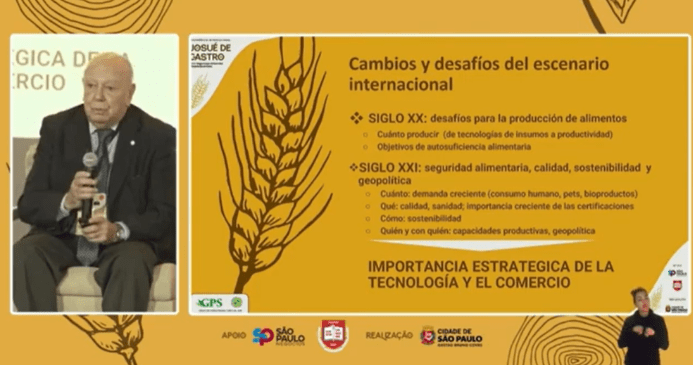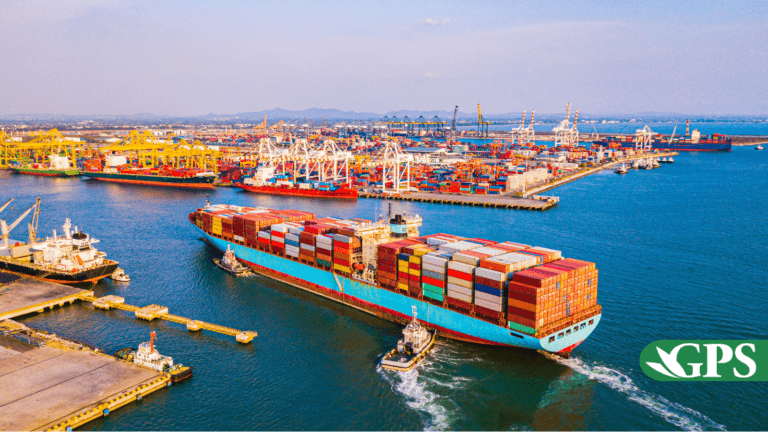La Nación, Suplemento de Comercio Exterior, 15 de Septiembre de 2020.
Interview with Marcelo Regúnaga, GPS Argentina Forum Coordinator and twice Agriculture Secretary of Argentina.
Argentina has potential and a market in the world of agri-food, but the permanent change in the rules of the game means that it cannot take advantage of it. Marcelo Regúnaga, twice secretary of Agriculture and academic director of the Agribusiness and Agrifood Industry Area of the University of San Andrés (UdeSA) insists on the concept: “There is a market, the problem is that for any long-term investment activity, clear policies, predictable rules of the game”.
He reviews that the economies of Asia and those of North Africa have grown in recent years and generated an increase in their middle classes and in the demand for protein. In his exhibitions he usually graphs the magnitude of this takeoff with the fact that "every two years an Argentina is built in China".
He understands that what happens in world food in the next 30 or 40 years will depend on how much Latin America grows and how much Asia ”, since countries like China and India are increasing their production but it is not enough to supply local consumption, while that of South America could expand more and supply those markets.
Regional economies, the bioeconomy and the added value are, in his opinion, the potential that Argentina should not miss. Regarding the segment of organic production - where the country has a presence - he warned of a threat. “The European Union is proposing a re-discussion of the green pact and hopes, in a short time, that 30% of all agriculture will be organic. If it is fulfilled, it is possible that they will lose the possibility of exporting and we must be cautious, because that subsidized production will be growing significantly. Argentina, rather, should concentrate on adding value”.
-Does the world play in favor of Argentina?
-Argentina has been wasting the opportunity so far in the 21st century due to a significant growth in demand from emerging countries such as China, Vietnam and South Korea. In Latin America, Brazil, Uruguay and Paraguay even take advantage of it much more. Imports are limited here and there is a heavy tax burden… There are very important issues that make up the change in the world demand for food.
-Because of the higher protein consumption in the East?
-For this reason, because more products with higher added value are demanded, because blockchain and traceability have gained importance. The Chinese consumer buys from the cell phone and is not limited to a commodity. Argentina must add added value; has with what Technological change makes it possible to increase grain productivity. We are producing three million tons and we could reach four million and gain participation not only in China, Vietnam, Korea, Indonesia, but also in several countries in North Africa. Also run this for meat and dairy processing.
-There are other countries that win market to Argentina.
-For example, New Zealand but it has a certain volume ceiling. China imports milk for babies, a product of very high value and much demand; there for example, there is an opportunity. But there are also chances with new technologies in which Argentina has advanced a lot, such as the certification schemes that meet the demands posed by consumers. In that model, there is great potential. The problem is that as one advances in added value and long-term responses, production difficulties begin because some six years of investment processes are required and macroeconomic instability is a huge stumbling block. The country had an agricultural revolution after 10 years of stability and deregulation, but a good part of that was complicated, it has become very difficult to export and much more for SMEs that add value is missing.
-In what niches do you see these possibilities?
-There are very interesting companies. For example, those that make canned vegetables have a very good level of quality but face problems such as the exchange rate, rising costs, inflation, inputs that cannot be imported... The market is there, the problem is that for any long-term investment activity requires clear policies and predictable rules of the game.
-The growing demand for organic food, can Argentina take advantage of it?
-There are activities, such as the production of meat, there is a production system that is very friendly to the environment; the main chains propose low or neutral carbon certification. This requirement allows us to begin to differentiate products. For example, Uruguay has sold its “green image” better. Argentina has that and a brand.
-And the rest of the organic food?
-Organic production is niche. It allows adding price but the markets are small and, on many occasions, there is a loss of productivity when moving from a traditional production system to an organic one. That 20% or 30% more that can be achieved begins to be lost after a while. They are not products that can be thought of massively. Argentina is an important producer of organics. There is a threat: the European Union is proposing a re-discussion of the green pact and hopes, in a short time, that 30% of all agriculture will be organic. If it is fulfilled, it is possible that they will lose the possibility of exporting and we must be cautious, because that subsidized production will be growing significantly. Rather, Argentina should concentrate on adding value.
-How much do rule changes impact the search for new markets?
-In the case of meat it is important, but it is a problem in general. The lack of State policies is a problem, the rules of the game change every day. Imagine a company that makes an export strategy and restricts operations; or I decide to make wheat and corn and there are problems with the fertilizers. In cattle breeding, the heaviest animals demanded for export have slow responses; They have been around for years and if, in between, they change the conditions, a problem is generated. In this way, more than once, a producer or an initiative that puts the effort of market development and organizes a target platform that differs from producing a commodity is discouraged. Long-term policies are required; support is needed from the public sector, from alliances with the private sector.
-Which countries advanced in that line?
-We can look at the success of Australia, New Zealand and even Brazil. In cases like this, market studies, logistics platforms, all intelligence work help. What used to be the Fundación Exportar or the Investment Agency do not have important budgets and they need them. The scheme is not only promoting trade, it must also advance in business alliances, in the vertical integration of different forms of cooperation. Public-private articulation is important. There is the market, we have the potential, we do not create the economic environment.
-How much do taxes distort export possibilities?
-All the policy that taxes foreign trade is a problem that leads to the ports. The cascading taxes that were added hurt more to the interior. The tariff policy is the most anti-federal possible. In the non-Pampas economies we have enormous possibilities, but we don't take advantage of them either. They even open alternatives for the growth of employment, for the populations of the interior.
-There are sectors that insist that biofuels are another avenue that the country could exploit...
-The bioeconomy has enormous potential; are all the transformations that can be given to biomass to add value to differentiate the primary product, more unit value is generated. For example, in Córdoba, the Association of Argentine Cooperatives (ACA) or Bio4 instead of selling a commodity generate energy, they produce food for animals with solid waste. If one follows the process, carbon dioxide is made, biofertilizers can be generated. There are enormous possibilities for added value. The same happens in the forestry sector; all waste can be used in developments to generate electricity. Public policies do not pay enough attention to this key segment. We had a shortage of diesel, there were no dollars to import and instead of using biodiesel in a higher proportion or more ethanol in gasoline, we reduced the mix. If we want a strategy of more added value in the interior, we must modify the current tax structure, which is anti-federal. There are many statements by officials but the realities are different. The rules of the game imply having an agency, a tax structure that does not limit and stability in the rules.



